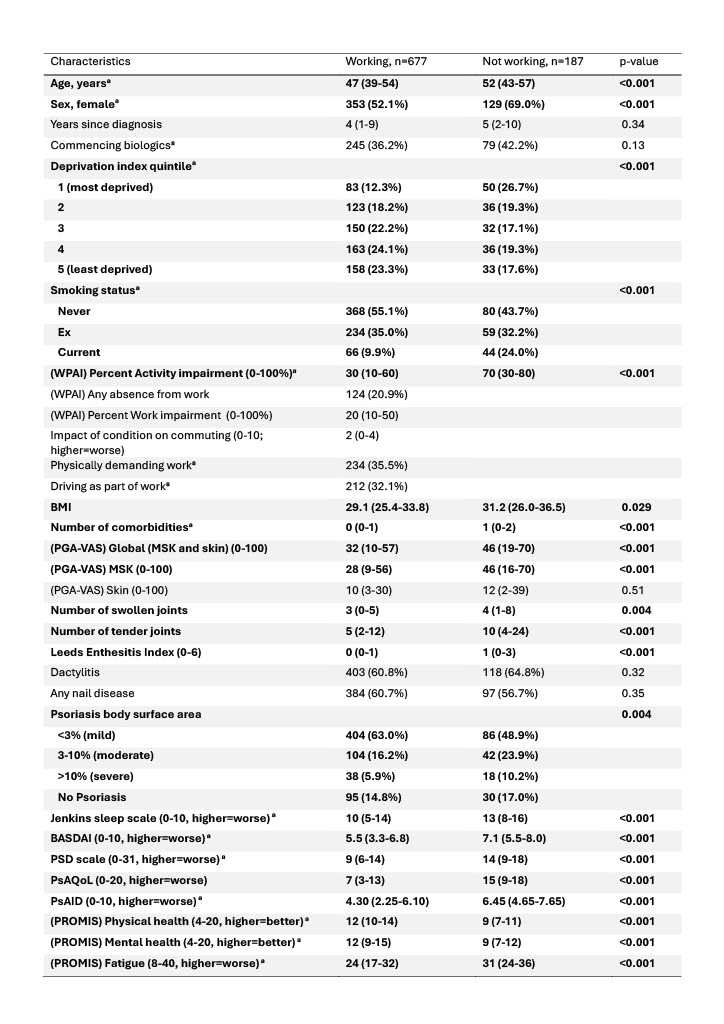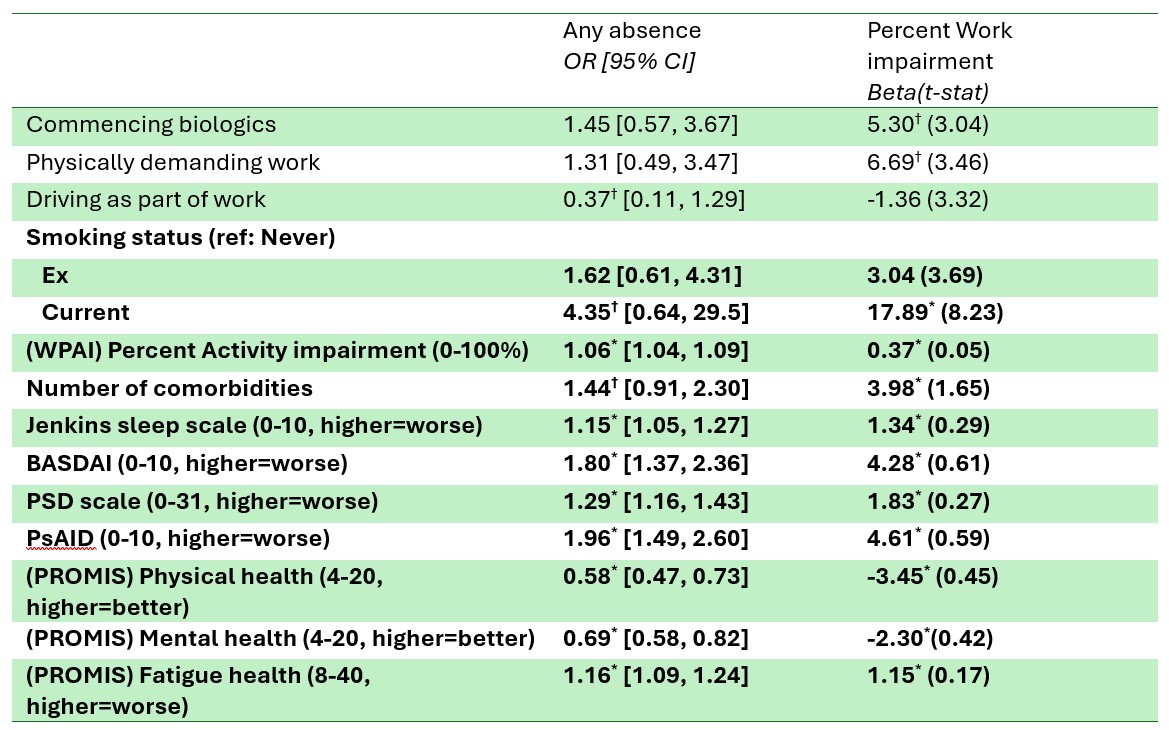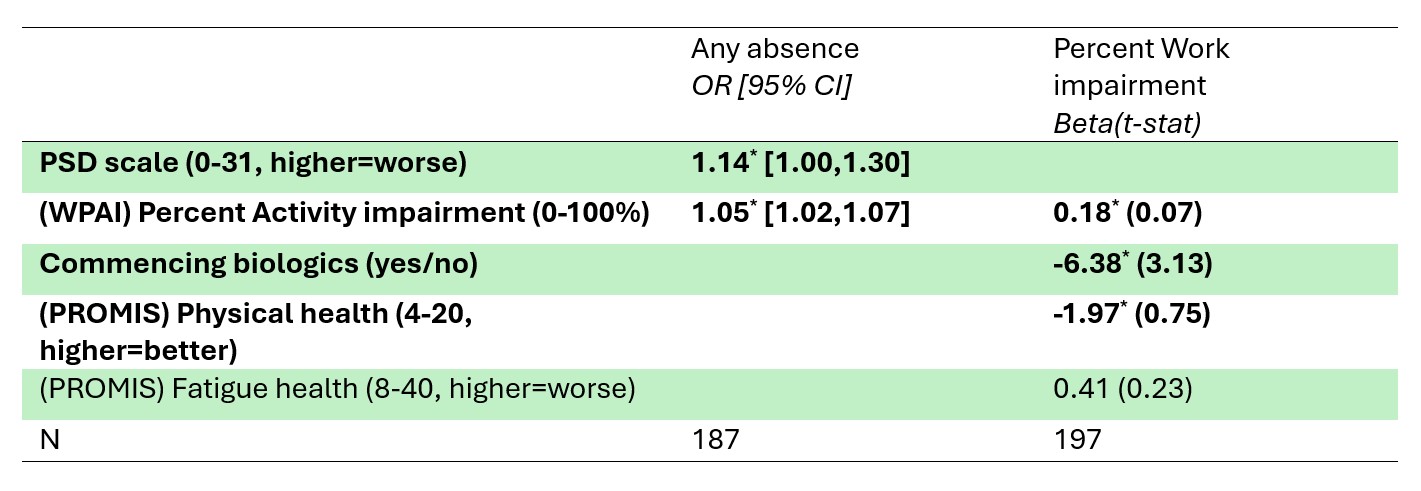Session Information
Date: Monday, November 18, 2024
Title: SpA Including PsA – Diagnosis, Manifestations, & Outcomes Poster III
Session Type: Poster Session C
Session Time: 10:30AM-12:30PM
Background/Purpose: People with PsA often report that their condition affects their ability to work. Poor work outcomes, such as work impairment, absence or leaving work, not only reduce individual quality of life but also have economic consequences for society. Identifying modifiable risk factors for poor work outcomes in patients with PsA can help inform early interventions.
Methods: This analysis includes patients from the BSR-PsA register (Jan 2024 data release), who reported work-related information. Work impairment and absence were assessed using the Work Productivity and Activity Impairment Questionnaire (WPAI). Potential predictors of work outcomes considered included work-related factors (e.g., a physically demanding job), lifestyle factors (e.g., smoking), clinical factors (e.g., comorbidities), and patient-reported measures (e.g., PsA Impact of Disease (PsAID), severity of fibromyalgia symptoms using the polysymptomatic distress (PSD) scale). Generalized estimating equation regression models, adjusted for age, sex, and deprivation, were conducted to identify predictors of absence and work impairment 12 months later.
Results: A total of 864 persons are included in this analysis, of whom 677 participants (78%) were working at the time of recruitment. Of those working, 52% were female, with a median age of 47 years and time since diagnosis of 4 years, while 36% were about to start a new biologic or tsDMARD. Amongst the 592 who completed the WPAI, with reference to the previous week, 21% reported work absence and 77% some work impairment (median % work time with impairment: 20%; IQR: 10%-50%) (Table 1). The likelihood of working at baseline (adjusted for age, sex, and deprivation) was lower amongst smokers (OR: 0.29; 95% CI: 0.17-0.48), and individuals with a higher number of comorbidities (0.79; 0.69-0.91; per additional comorbidity), higher BASDAI (range 0-10) (0.73; 0.66-0.81; per unit increase), and higher impact of disease (PsAID, range: 0-10) (0.71; 0.65-0.78; per unit increase).
Of 176 participants working at baseline who had reached and provided data at 12-month follow-up, 11 (6.3%) reported leaving work. Among those who remained in work, higher BASDAI, PsAID, activity impairment, sleep problems, fatigue, poorer physical and mental health and severity of fibromyalgia symptoms were significantly associated with absence and work impairment in the 7 days prior to follow-up (Table 2).
Multivariable models for absence and work impairment suggested that the severity of fibromyalgia symptoms independently predicted future absence (OR: 1.14; 95% CI: 1.001 -1.30; per unit increase in PSD), while activity impairment independently predicted future absence (1.05; 1.02-1.07; per percentage increase) and work impairment (β: 0.18; p < 0.05; per percentage increase). Commencing biologics (β: -6.38; p < 0.05) and better physical health (β: -1.97; p < 0.05; per unit increase) were independently associated with lower future work impairment (Table 3).
Conclusion: Managing disease activity with biological treatment reduces work impairment, but improving physical health and fibromyalgia symptom severity, to further reduce work impairment, is likely to require additional non-pharmacological approaches.
To cite this abstract in AMA style:
Xu L, Jones G, Rotariu O, Helliwell P, Siebert S, Hollick R, Macfarlane G. Predictors of Work Impairment and Absence Amongst People with Psoriatic Arthritis (PsA) – Evidence from the British Society for Rheumatology PsA Register (BSR-PsA) [abstract]. Arthritis Rheumatol. 2024; 76 (suppl 9). https://acrabstracts.org/abstract/predictors-of-work-impairment-and-absence-amongst-people-with-psoriatic-arthritis-psa-evidence-from-the-british-society-for-rheumatology-psa-register-bsr-psa/. Accessed .« Back to ACR Convergence 2024
ACR Meeting Abstracts - https://acrabstracts.org/abstract/predictors-of-work-impairment-and-absence-amongst-people-with-psoriatic-arthritis-psa-evidence-from-the-british-society-for-rheumatology-psa-register-bsr-psa/



